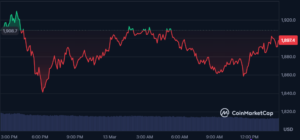- Vitalik Buterin has reaffirmed Ethereum’s core mission of expanding its user base by prioritizing openness, security, and censorship resistance.
- He outlined an optimistic vision for Ethereum’s future, emphasizing the need to improve existing decentralized systems like DAOs and ICOs.
Vitalik Buterin has been a vocal figure not only concerning Ethereum’s development but also regarding the wider cryptocurrency landscape. Recently, during the Based Rollup Summit hosted by Taiko, the Ethereum co-founder took the stage reaffirming Ethereum enthusiasts about Ethereum’s core mission.
Notably, as per the co-founder, Ethereum’s fundamental goal is to attract a vast user base while simultaneously improving its security and censorship resistance.
In a landscape barraged with technical complexities and market-driven hype, Buterin’s message was straightforward, highlighting Ethereum’s bedrock principles.
In the summit, Buterin, as on previous occasions, asserted that Ethereum’s goal remains constant. As per the leader, the crosshairs focus on attracting users who genuinely value these characteristics. Additionally, it attracts users who seek centralized systems that can be prone to manipulation and control, in this case, memecoins.
It is in Ethereum’s best interest to offer real-world utility in contrast to fleeting trends and market hype.
Notably, Buterin sees Ethereum’s future as a revolutionary. The co-founder proposes a future that revolves past ‘normal’ blockchain plans including ICOs, DAOs, Radical Markets while actively addressing the associated risks and understand the impact of social interactions within the network.
Despite the aspiration, these initiatives have faced challenges. ICO have faced the lack of regulatory oversight which have resulted to scams and therefore losses. DAOs on the other hand, have grappled with issues of decision-making and security.
Buterin’s vision is one of refining seamlessness and improvement. He envisions a future where the positive aspects of these initiatives are harnessed while the negative aspects are minimized. This requires a nuanced approach, one that balances innovation with responsible development.
For instance, he likely sees a future where ICOs evolve into more regulated and transparent fundraising mechanisms, where DAOs adopt robust governance structures that ensure fair and efficient decision-making, and where Radical Markets find practical applications that address real-world problems. Furthermore, he seeks a social layer that fosters constructive dialogue and collaboration, rather than division and conflict.
Ultimately, Buterin’s message is one of pragmatic optimism. He recognizes the challenges that Ethereum faces, but he remains confident in its potential to transform the digital landscape. By focusing on attracting a wider user base, strengthening security, and refining past innovations, Ethereum can solidify its position as a leading platform for decentralized applications and services.




